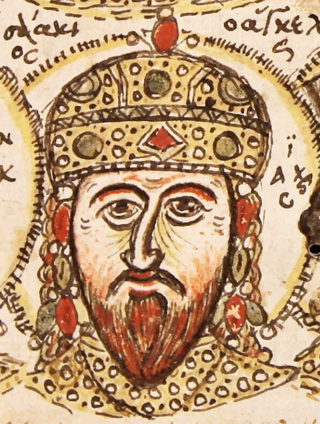Angelos was a Greek noble lineage which gave rise to three Byzantine emperors who ruled between 1185 and 1204.
Angelos may also refer to:

Alexios III Angelos, Latinized as Alexius III Angelus, was Byzantine Emperor from March 1195 to 17/18 July 1203. He reigned under the name Alexios Komnenos associating himself with the Komnenos dynasty.

Isaac II Angelos or Angelus was Byzantine Emperor from 1185 to 1195, and co-Emperor with his son Alexios IV Angelos from 1203 to 1204. In a 1185 revolt against the Emperor Andronikos Komnenos, Isaac seized power and rose to the Byzantine throne, establishing the Angelos family as the new imperial dynasty.
The House of Komnenos, Latinized as Comnenus, was a Byzantine Greek noble family who ruled the Byzantine Empire in the 11th and 12th centuries. The first reigning member, Isaac I Komnenos, ruled from 1057 to 1059. The family returned to power under Alexios I Komnenos in 1081 who established their rule for the following 104 years until it ended with Andronikos I Komnenos in 1185. In the 13th century, they founded and ruled the Empire of Trebizond, a Byzantine rump state from 1204 to 1461. At that time, they were commonly referred to as Grand Komnenoi, a style that was officially adopted and used by George Komnenos and his successors. Through intermarriages with other noble families, notably the Doukas, Angelos, and Palaiologos, the Komnenos name appears among most of the major noble houses of the late Byzantine world.

Euphrosyne Doukaina Kamaterina or better Kamatera was a Byzantine Empress by marriage to the Byzantine Emperor Alexios III Angelos.

The AIMA prophecy was a prophecy current during the reign of the Byzantine emperor, Manuel I Komnenos and at the same time an example of a medieval contrived acronym.
AlexiosBranas or Vranas was a Byzantine nobleman, attempted usurper, and the last Byzantine military leader of the 12th century to gain a notable success against a foreign enemy.
Manuel Kamytzes Komnenos Doukas Angelos was a Byzantine general who was active in the late 12th century, and led an unsuccessful rebellion in 1201–02, against his cousin, Emperor Alexios III Angelos.
John Doukas, Latinized as Ducas, was the eldest son of Constantine Angelos by Theodora Komnene, the seventh child of the Byzantine Emperor Alexios I Komnenos and Irene Doukaina. John Doukas took the family name of his grandmother Irene. He served as a military commander under Manuel I Komnenos and Isaac II Angelos. Isaac II, who was Doukas's nephew, raised him to the high rank of sebastokrator. Despite his advanced age, he continued to be an active general in the 1180s and 1190s, and until shortly before his death aspired to the imperial throne. He was the progenitor of the Komnenos Doukas line, which founded the Despotate of Epirus after the Fourth Crusade.
The history of Thessaly covers the history of the region of Thessaly in north-central Greece from antiquity to the present day.
The House of Angelos, Latinised as Angelus, was a Byzantine Greek noble family that produced several Emperors and other prominent nobles during the middle and late Byzantine Empire. The family rose to prominence through the marriage of its founder, Constantine Angelos, with Theodora Komnene, the youngest daughter of Emperor Alexios I Komnenos. As imperial relatives, the Angeloi held various high titles and military commands under Emperor Manuel I Komnenos. In 1185, following a revolt against Andronikos I Komnenos, Isaac II Angelos rose to the throne establishing the Angeloi as the new imperial family that ruled until 1204. The period was marked by the decline and fragmentation of the Byzantine Empire, culminating in its dissolution by the Fourth Crusade in 1204 under Alexios IV Angelos.
Andronikos Palaiologos or Andronicus Palaeologus may refer to:
Sebastokrator, was a senior court title in the late Byzantine Empire. It was also used by other rulers whose states bordered the Empire or were within its sphere of influence. The word is a compound of sebastós and krátōr. The wife of a Sebastokrator was named sebastokratorissa in Greek, sevastokratitsa (севастократица) in Bulgarian and sebastokratorica in Serbian.
Theodora Komnene was a Byzantine noblewoman, being the fourth daughter of Emperor Alexios I Komnenos and Irene Doukaina. She married Constantine Angelos, by whom she had seven children. Byzantine emperors Alexios III Angelos and Isaac II Angelos were her grandsons, thereby making her an ancestor of the Angelos dynasty.
John Kantakouzenos was a military commander and an early member of the Kantakouzenos family. The contemporary historian Niketas Choniates describes him as a brave, audacious and experienced soldier but frequently led astray by his foolhardiness and presumption.
Andronikos Angelos Doukas was a Byzantine aristocrat related to the ruling Komnenos dynasty. During the reign of his cousin, Manuel I Komnenos, he served without success as a military commander against the Seljuk Turks, and as envoy to the Kingdom of Jerusalem. Following Manuel's death, in 1182 he was sent to stop the rebellion of Andronikos I Komnenos, but was defeated and eventually defected to him. Shortly after, he led a failed conspiracy of leading aristocrats against Andronikos I. When it was discovered, Andronikos and his sons fled the Empire, ending up in Acre, where he died. He was the father of emperors Isaac II Angelos and Alexios III Angelos.
Constantine Angelos was a Byzantine aristocrat who married into the Komnenian dynasty and served as a military commander under Manuel I Komnenos, serving in the western and northern Balkans and as an admiral against the Normans. He was the founder of the Angelos dynasty, which went on to rule the Byzantine Empire in 1185–1204 and found and rule the Despotate of Epirus (1205–1318) and the Empire of Thessalonica (1224–1242/46).
Andronikos Angelos can refer to:
Constantine Komnenos Angelos was a Byzantine aristocrat and military commander, and the older brother of the emperors Isaac II Angelos and Alexios III Angelos. He was blinded by the usurper Andronikos I Komnenos, and raised to sebastokrator by his brother Isaac upon the latter's accession to the throne in 1185.